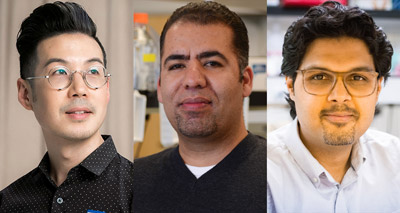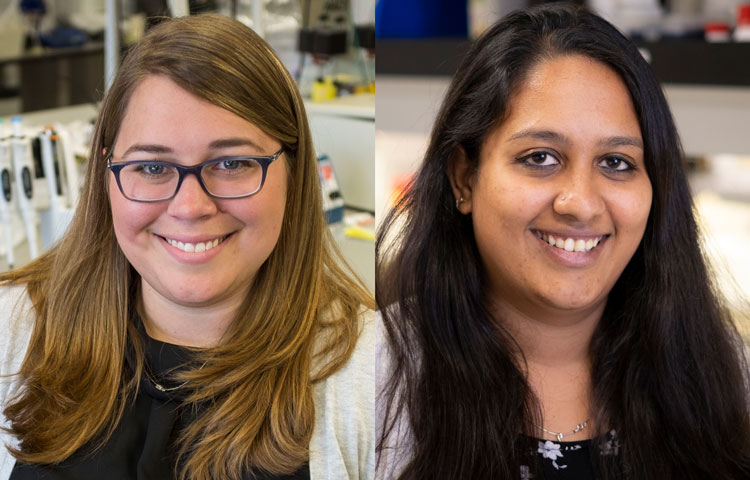Award pays tribute to postdoctoral researcher who succumbed to cancer at age 33
Eric Dudl’s lifelong dream to be a scientist was just starting to come true. He’d begun his postdoctoral research in a cancer lab at Sanford Burnham Prebys, where he was known as kind, helpful and the “go-to guy” when an unfamiliar piece of machinery arrived.
Watch the virtual ceremony honoring the winners of the Dudl scholarship award, including remarks by Eric’s family, their faculty mentors and the interim head of our National Cancer Institute (NCI)-designated Cancer Center, Ze’ev Ronai.
Then, at age 32, he was diagnosed with cancer. The diagnosis only reaffirmed his passion for science, and he often returned to the lab after a long day of chemotherapy.
“One day when he was quite ill, I looked at Eric and said, ‘Why don’t you take some time off of work. Get your energy back and go back in when you feel better,’” says Jim Dudl, MD, Eric’s father, at the ceremony honoring this year’s scholarship recipients. “He immediately looked up at me and said, ‘Why would I do that? This is the best job in the world!’”
Eric underwent five rounds of chemotherapy, but the tumor was aggressive. Only nine months after the initial diagnosis, he succumbed to the cancer. He was 33.
Today, Eric’s memory lives on in the form of the Eric Dudl Endowed Scholarship Award, created by Eric’s family in 2007 to support talented postdoctoral researchers working in the cancer field. This year’s virtual event celebrated the 2019 and 2020 scholarship winners: Jennifer Hope, PhD, a postdoctoral researcher in the Linda Bradley lab; and Archna Ravi, PhD, a postdoctoral researcher in the Brooke Emerling lab.
“This scholarship fund is truly the best way that we can honor Eric because he was so passionate about education and supporting others,” says Bret Dudl, Eric’s brother. “The fact that he now helps other postdocs further their work to fight cancer is exactly what he would have wanted.”

Where are they now? From left to right: Past Dudl Scholarship award winners include Eric Lau, now an assistant member at the Moffitt Cancer Center; Robert Tinoco, now an assistant professor at UC Irvine; and Gaurav Pathria, now a scientist at Genentech.
As in past years, each scientist was nominated by leaders at Sanford Burnham Prebys’ National Cancer Institute (NCI)-designated Cancer Center and then selected by Institute president and Pauline & Stanley Foster Presidential Chair Kristiina Vuori, MD, PhD
“These talented scientists truly pick up where Eric had to leave off,” says Barbara Dudl, Eric’s mother. “We are so grateful to the Institute for their compassion for Eric during his illness and as we worked to create this scholarship, and the scientists who are now working on discoveries that might one day save the life of someone like Eric.”
Jennifer Hope, PhD (Linda Bradley lab)
Tell us a little bit about your research. If all goes well, what do you hope to achieve?
I’m working to understand why the immune system, specifically T cells, seems to turn a “blind eye” to tumors—in contrast to other foreign invaders such as viruses.
Over the last few years, our studies have pinpointed one molecule that transforms T cells and can help slow, stop, and in some cases, even eliminate, tumors in mice.
My ultimate hope is that we use this information to create better cancer treatments, particularly for skin cancer (melanoma), which remains a deadly cancer.
What does this award mean to you?
It is a great honor to have received this award, particularly because of the story behind it! We may all have different reasons for going into science and research, but one thing we all share is passion for our work. We also know how taxing cancer therapies can be on a patient’s mind, body and soul, so for Eric to have continued his work with such diligence while undergoing treatment is truly inspirational and speaks to his resilience and character.
How does this award advance your work?
With this award, I was able to travel to Pittsburgh, Pennsylvania, where I spent a week in the lab of a renowned T cell expert. There, I gained invaluable hands-on experience with assays that I could bring back to my lab here and have already implemented in our work. The timing of this award, which I received in 2019, was very lucky. I completed the weeklong residency in January of 2020 just before COVID-19 had taken off in the U.S.
Archna Ravi, PhD (Brooke Emerling lab)
Tell us a little bit about your research. If all goes well, what do you hope to achieve?
Scientists know that rapidly growing cancer cells become desperate for nutrients and start to use alternative pathways to get “food.” It’s a bit like, “If you aren’t going to feed me, I’m going to feed myself.” I’m studying a family of proteins that controls two of these alternative pathways (autophagy and mitochondrial metabolism). If we can block two important ways a tumor “feeds” itself, we believe we can create a very effective drug that can starve a tumor.
I hope my work will ultimately lead to better cancer therapeutics, especially for triple-negative breast cancer and sarcomas. These are very difficult tumors to treat; and we need better, targeted therapies to help more people survive these cancers.
What does this award mean to you personally?
Anyone who has heard Eric’s story has been inspired by it. It’s the sort of dedication and perseverance that I hope to achieve in my career. In the face of the disease, Eric chose to continue working on something he truly enjoyed and believed in. It’s about doing what you’re passionate about no matter what hurdles are thrown your way. For my work to be recognized with this scholarship is a great honor.
How will this award advance your work? What will you be able to achieve now?
As a postdoctoral researcher, I’m on the threshold of a new path in my career. I plan to use the funds to “attend” conferences where I can share my work and network with people all over the world. This award really supports my career goal of becoming an independent scientist.
Anything else you would like us to know?
For me, cancer research is not just about doing good science. It’s about ensuring that no one has to fear losing loved ones to this disease. My mom was diagnosed with breast cancer a few years back. Thankfully, she’s doing well now after surgery and chemotherapy. But that experience, and the fear that we both felt, stays with me today.
Along these lines, many people aren’t aware that the research needed to create a new drug starts at nonprofit organizations such as Sanford Burnham Prebys. The hardest part—the actual science notwithstanding—is getting the funding to carry out such research. No contribution to science is too small! Every gift increases the chances that we can find new treatments.
Read more about the Eric Dudl Endowed Scholarship Fund, or support early-career researchers, by donating to the fund.
